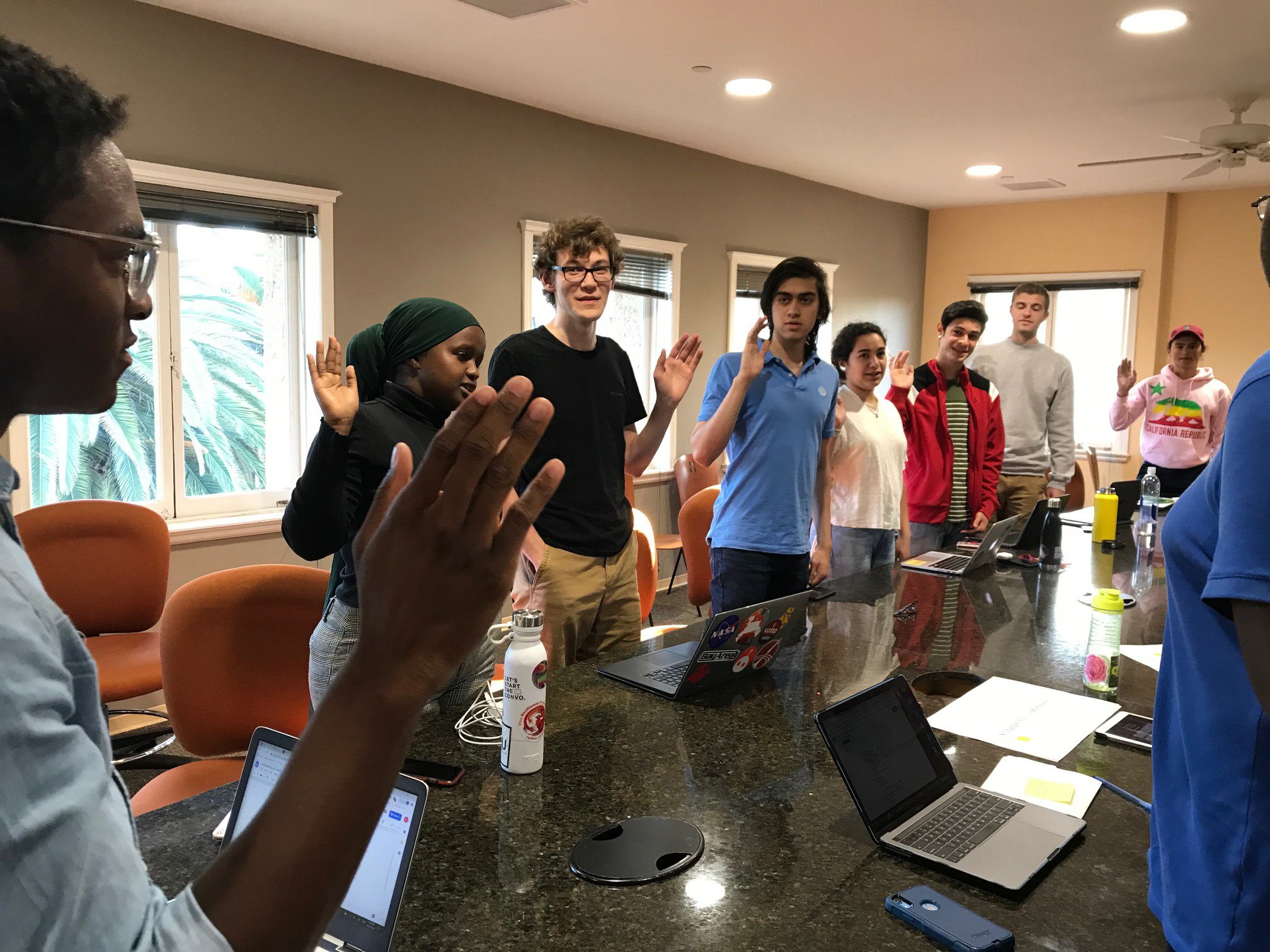The inaugural meeting of the 21st Undergraduate Senate kicked off with the senators taking their oath of office. After swearing to uphold the values of the Associated Students of Stanford University (ASSU), the legislators elected Senate positions for the duration of the meeting.
Chair
Senator Munira Alimire ’22 and returning Senator Martin Altenberg ’21 nominated themselves for the position.
Alimire delivered her statement first.
“I’ve seen a lot of the ways the Senate has done really good things this year, but there have been some pitfalls, specifically in efficiency and transparency,” she said.
Alimire said she plans to reliably post the meeting minutes online, create a social media presence for the Senate and invite outsiders to attend meetings to make students feel that their voices are important and understand what exactly the Senate does.
She said that though nothing could prepare someone for the chair position, she cited her experience on the Minnesota Legislative Youth Council and her comfort with ASSU governing documents and bylaws.
In Altenberg’s statement, he said that as last year’s chair of the Student Life Committee, he saw the power of ASSU. His previous term focused on the creation of a student activities directory, hosting two town halls, working with community centers and increasing transparency and accountability. Over the last two quarters, Altenberg surveyed former and current senators’ projects with the intention of making the data available for senators interested in continuing abandoned projects and for the student body to raise accountability. At present, his survey is complete but data has not yet been released.
Once the speeches were over, Alimire and Altenberg left the room and the senators deliberated over whether experience on Senate or real-world experience in state government should be valued.
“There are going to be issues next year that we will need someone with a very strong voice,” Senator Micheal Brown ’22 said. “It’s important to me that our Senate is relevant.”
“We need to have someone who is cultivating and inspiring,” Senator Kobe Hopkins ’22 said. “They have to be excited and get us mobilized.”
Senator Veronica Ayala ’22 countered that a leader who excites isn’t necessarily effective.
The vote resulted in a 4-4 tie, with three abstaining, so senators were allowed more time to deliberate.
In the second round of deliberation, the identities, personalities and workloads of the candidates were discussed.
Alimire won 7-3 on the second vote, with one abstaining. She then took her seat at the head of the table and proceeded to lead the remainder of the meeting.
“If you couldn’t tell, I’m full of exuberance [and] joy,” Alimire told The Daily after the meeting. “There’s a lot of wonderful people [on the Senate]. I’m a very friendly person, and I do not think that my connections with people on the team who are on Senate will pose any problems. In fact, I think it’ll be easier because when people fall off the ball, it’ll be easier to reach out to them as a friend.”
Deputy chair
Brown and Ayala nominated themselves for the position. Senator Anthony Duarte ’22 nominated senator and ASSU co-director of mental health Jennalei Louie ’21, who was not present at the meeting and thus could not give a statement.
Ayala spoke of how she familiar with Stanford’s governing bodies and wanted to ensure that communication is improved and that ASSU “fulfills the needs of every student.” Ayala worked in LA’s city government, brought bills to the California state capitol and learned about committee functions and marketing through her work with the Hispanic Scholarship Fund.
Brown’s ideas included involving members of the Senate Associate Program (SAP) earlier in the year. Brown proposed partnering “SAPlings” with mentors from the Senate to get them engaged in Senate and its projects. Brown has experience on Ujamaa’s dorm government council and Houston’s city government.
Senator Jonathan Lipman ’21 pointed out Louie’s former position as co-director of mental health, the fact she made a movie for mental health awareness on campus and has experience dealing with administration.
Nominees were questioned over how they would handle conflict, how much time they plan to dedicate to Senate and what experiences they can recall that they showed strength or leadership.
During deliberation senators weighed organizational experience, outside commitments, the visions the candidates presented and what type of personality would work well with Alimire.
Ayala was elected deputy chair 6-2-0, with one abstaining and no senators voting for Louie.
Appropriations committee chair
Senators Joshua Pe ’22 and Sam Schimmel ’22 and returning Senator Tim Vrakas ’21 nominated themselves for the chair of the appropriations committee.
Vrakas, a returning member to the appropriations committee, began his statement explaining the relatively technical role the committee plays. His proposals had three points: “Proportional, procedural and projects.”
Vrakas said that said that the committee has spent the same amount of time discussing whether to allocate $1,000 worth of Uber rides as they did discussing whether $250 should go to Stanford Concert Network. He said that the amount of time spent discussing something should be proportional to its importance. Several snaps echoed throughout the room.
As for procedural, Vrakas said it’s important to have smooth transitions and try to get senators to return. Lastly, the projects Vrakas would like to take on involved improving campus life that he has repeatedly heard is viewed as “dead.”
The vote for Vrakas was unanimous.
Vote for appropriations committee membership
Filling the five remaining slots on the appropriations committee are Brown, Ayala, Hopkins, Pe and Eva Davis ’22.
Hopkins ran uncontested and was unanimously voted treasurer of appropriations by the new committee.
Also in attendance were ASSU financial manager Lauren Phillips, who will present the budget at the beginning of next week’s meeting, and newly elected ASSU executives Erica Scott ’20 and Isaiah Drummond ’20.
Contact Sonja Hansen at smhansen ‘at’ stanford.edu.
